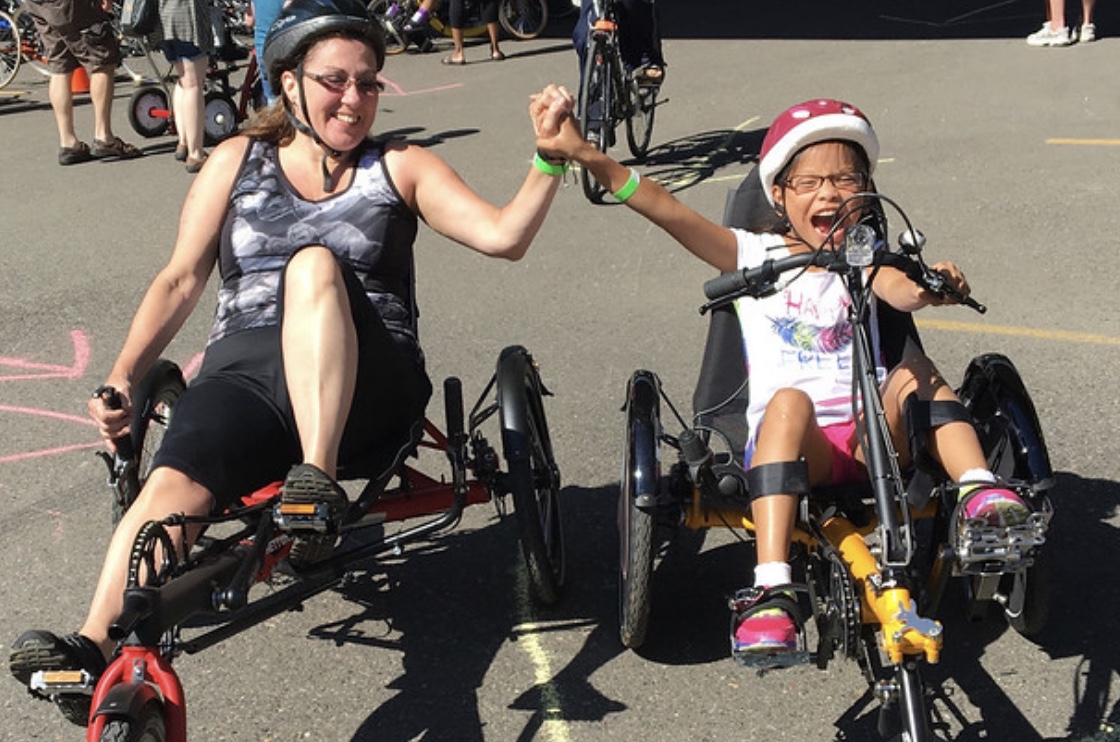
(Photos: J.Maus/BikePortland)
After taking criticism from local accessibility advocates and from the transportation commissioner’s political challenger, Portland says it’ll fund a discounted rental program for handcycles and trikes.
It seems to be the first such program in the country, though city staff couldn’t say for sure.
The goal is to make it possible for more people with disabilities get access to bicycles, in the same way that most other people will have an option to use Biketown, the publicly backed bike sharing system that launches July 19.
The federal Americans with Disabilities Act is a major consideration in other forms of public transit. TriMet dedicates 10 percent of its $344 million operations budget to running a scheduled shuttle service (called LIFT) for people with major mobility challenges, as required under the federal law. But it’s currently ambiguous whether bike sharing, a relatively new form of public transit, has comparable obligations.
Here’s the city’s description of its proposed accessibility program:
It focuses on medium length rental (1-3 hours) through existing bike rental businesses located on or in close proximity to non-motorized trails. PBOT would purchase the adaptive bicycles and work with participating bike rental shops to provide the service. PBOT is considering providing both hand bicycles and three wheeled bicycles.
Many aspects of the proposal are still vague, including what it’ll cost, where the cycles might be rented and whether people would need to pay for their use.
“Right now we’re thinking about the purchase of six adaptive bicycles,” said Steve Hoyt-McBeth, who oversees the city’s bike share program, in an interview Thursday.
Hoyt-McBeth said he based the city’s plan on conversations with people who attended the city-sponsored Adaptive Bike Clinic on June 5.
‘For exercise and recreation’
“The program was developed directly out of the interviews I did with about a dozen people who used a wheelchair and expressed an interest in some sort of bicycle rental program,” Hoyt-McBeth said. “They said they wanted something where they could have somebody there to assist them moving between their wheelchair and the bicycle; they wanted someplace to store their mobility device; they wanted to ride for exercise and recreation; and they did not want to ride in traffic.”
Though these cycles would be branded as Biketown, the program would be run by the city itself (Biketown is an independent contractor that works for the city). And the way the cycles are used would be different than the one Hoyt-McBeth has been keeping in mind for the rest of the Biketown system, which is optimized for short one-way rides of 45 minutes or fewer.
But in other ways, this program will be informed by a similar philosophy.
“Sometimes the issue is not whether you own the device or not, it’s whether you have access to it,” Hoyt-McBeth said.
Transporting adaptive cycles by car is a major challenge
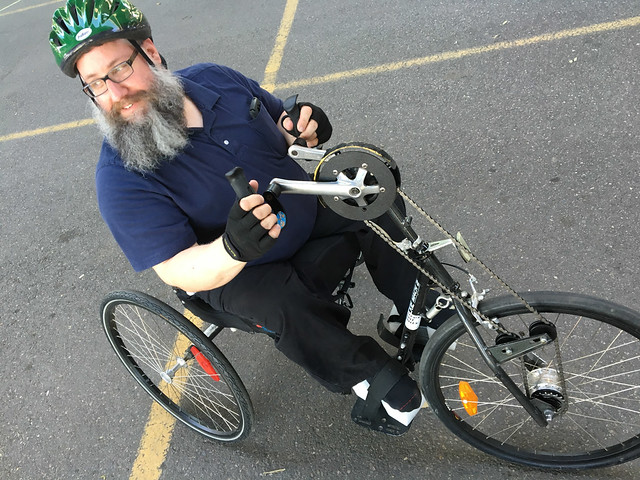
For example, Hoyt-McBeth said, he talked to a couple people who already own handcycles but lack an easy way to get it to a place they’d like to ride for recreation.
“I’ve got to put it in my car, I’ve got to drive somewhere,” Hoyt-McBeth said. “If I’ve got a partner or a spouse or whatever, I may need to put their bike in the car too. … Logistically it was really tough to use it. The idea of having a service that is centrally located downtown right on a multi-use path … was compelling to them.”
Then there are people who have disabilities but haven’t been able to or didn’t want to spend $1,500 for an adaptive cycle.
“I’m sure there will be a number of people that we will provide a much more financially accessible way to use a handcycle,” Hoyt-McBeth said.
Hoyt-McBeth noted that different people have many different types of disability, and this plan will only serve some.
“It’s a very wide and diverse community, and we want to make sure that we fully understand that,” he said. “I’ve not done very many interviews with people who have balance issues.”
Advertisement
Novick pushed action after political pressure from Eudaly
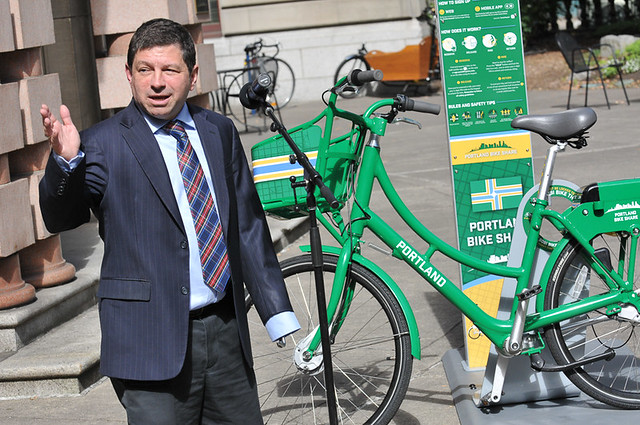
(Photo: J.Maus/BikePortland)
The city’s commitment was rolled out rapidly after an “early June” meeting between staffers for the Portland Bureau of Transportation and the office of Commissioner Steve Novick.
Novick is the only city council member currently up for election, facing bookseller-turned-politician Chloe Eudaly.
In a May 24 Facebook post (which her campaign sponsored to get in front of more people) Eudaly raised the issue of accessibility.
“It’s exciting to finally be getting a bike share program, but I was disappointed to find out that the program excludes people with mobility challenges,” she wrote. “How is a 1000 bike program without a single adapted bike equitable or inclusive?”
Sue Stahl, who serves on the Portland Commission on Disability and ran against Eudaly and Novick in the primary, had previously raised the issue during her own campaign.
All three politicians have personal connections to the issue. Stahl uses a mobility device. So does Eudaly’s son Henry. Novick was born without a left hand or fibula bones in his legs; he struggled to pedal a bicycle in childhood and hasn’t tried since, though he’s occasionally ridden them as a passenger.
We asked the Portland Bureau of Transportation about the issue on May 24, then heard nothing for nine days. On June 2, city spokesman John Brady said the city was “talking to our peer cities and people in the disability community.”
We covered the issue that day, and The Oregonian did so June 6.
Around that time, Novick got directly involved.
“We’ve been researching what other states are doing for a while,” Hoyt-McBeth said. “It’s fair to say that the public conversation about this issue this spring triggered us to look harder at it.”
The city says the “pilot concept will be further developed with community stakeholders this summer and fall, with a planned pilot launch in spring 2017.”
Brady said the city isn’t doing this specifically to comply with the Americans with Disabilities Act.
“We’re not doing this for legal reasons,” he said. “We’re doing it to make the system more accessible.”
Update: Eudaly put a new statement about the issue on her Facebook page. Here’s what she said in a short interview Friday:
Without putting a damper on what is a positive development, I remain concerned that 26 years after the ADA was passed, that we’re still not dealing with issues of access up front in our policymaking, planning, development. And that needs to end. … This should not have been the responsibility of individual citizens to take on. complying with the ADA and serving our whole community is the job of our elected officials and the people working for these bureaus.
— Michael Andersen, (503) 333-7824 – michael@bikeportland.org
Our work is supported by subscribers. Please become one today.



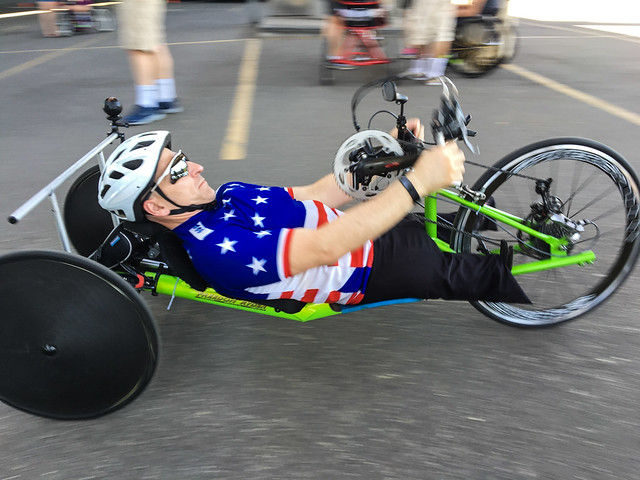
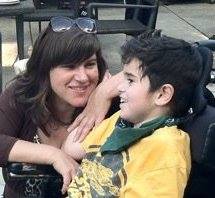
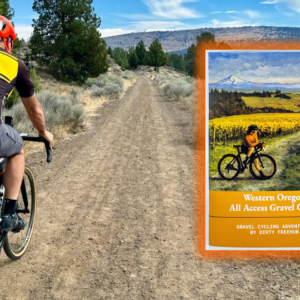

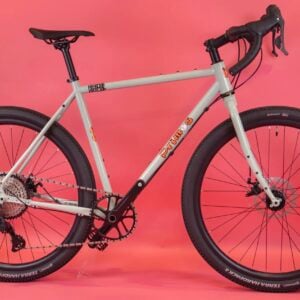
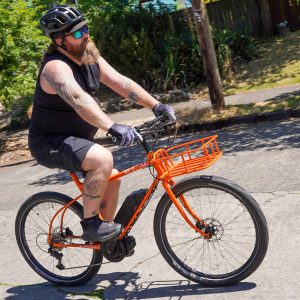
Thanks for reading.
BikePortland has served this community with independent community journalism since 2005. We rely on subscriptions from readers like you to survive. Your financial support is vital in keeping this valuable resource alive and well.
Please subscribe today to strengthen and expand our work.
Called it.
“JeffS June 3, 2016 at 6:22 am
Or… buy a couple of bikes, pay the bike rental place on the esplanade to store them. Have the people take transit down there to ride them.”
Eudaly’s son still won’t be able to participate because Biketown excludes ALL people under the age of 18. You cannot rent for a teenager or anything, they are simply forbidden.
As an aside.. has anyone else noted the striking likeness of Richard Fletcher to the late great Sheldon Brown?
I would love to try one of these bikes. But, as I’m someone who’s able to ride an upright bike with foot pedals, I would not want to take away any availability to the people who need them.
It might not be popular enough, but I would love to see more styles of bikes under the biketown branding. Maybe a few mountain bikes available near trails, some recumbent bikes near retirement homes, some smaller bikes for kids, some cargo bikes, especially near box stores, and maybe even one of those stair stepper bikes.
Oh, and integrating with transit cards!
A good start for providing opportunities for more bicycling/tricycling for those who need specially adaptive bikes. I have been riding a handcycle as a double BK amputee for 18 years and am still trying to get Amtrak to allow the handcycle (I call it a crank wheelchair) to accompany me on long train trips. So far, no dice. But to see Portland providing more opportunities for accessible cycling is a good, though small, start in expanding pubic consciousness and policies.
I think having a separate staffed rental service is the way to go here. Glad PBOT is listening to its customers and offering these bikes. I wonder what Chloe Eudaly will have to say about this.
I asked. Her campaign hasn’t responded.
I’ll be curious about usage statistics.
I hope they get tons of usage. But it’s still worthwhile if they get used once a year.
Go Chloe!!!
This is what many of us were calling for on the previous post. What Chloe was proposing made no sense. This makes sense.
Very heartening to see this. Thanks PBOT!
Thanks for the follow up. Note: Portland is definitely not the first city to include adaptive bikes in its bike share program. We went with a vendor that does not provide them, there are others that do. I sincerely hope that PBOT follows through on the stakeholder process and bring in experts in the field to conduct it. This is a step in the right direction but they can’t know the scope or level of demand after talking to just 12 potential users. Also, not everyone who needs an adaptive bike uses a wheelchair!
For sure on the diversity of folks who use adaptive bikes, Chloe. What other cities have included adaptive bikes in bike share?
I was curious, so I did a little research. It seems like there’s been more discussion here (Portland, especially bikeportland) than everywhere else combined. Here’s what I found.
Univ. Maryland and College Park MD: “More than 120 bikes are available at 14 stations throughout campus and the city, including several adaptive bikes so that people of all abilities are able to ride.” (through Zagster)
Bublr, Milwaukee: “If you have more specific accessibility needs Independence First and Milwaukee Recreation both have DUET bikes that can be borrowed free of charge.”
A possible Boise program: “One [bikeshare] vendor is, however, producing a three‐wheel version of a trike”
“there are others that do”
Example(s) please?
Two thumbs up! I’ve worked with people with disabilities for the last 7 years and this is really great to see.
Greetings Portland! Yes, the conversation you are having on including bike options for persons with disabilities is going on in other communities as well. After reading many of the posts on this site, I have to say I was overwhelmed with the number of creative ideas that the people of Portland have been coming up with regarding how to include your citizens and visitors with disabilities in your bike share program. Portland may very well be leading the country in how to do so for those cities who have chosen a vendor who does not have bike options for this population.
Below are some examples, articles and a webinar with more info. So far I only know of one national bike share vendor who has figured out how to build a system to include alternate bikes. That is Zagster. As other cities come up with ideas to make bike share more accessible to people with disabilities, hopefully there can be some type of forum to share that info with one another. It is really refreshing to read the positive comments coming out of Portland regarding thinking of your fellow citizens with disabilities and working to include them in your program. Keep rolling Portland with developing a model so that other cities do not need to reinvent the wheel!
Corvallis, OR (to include adult trikes)
http://zagster.com/press/zagster-brings-bike-sharing-to-corvallis/
Los Angeles (Exhibit B, page 5, item #15)
http://libraryarchives.metro.net/DB_Attachments/150615_Amendment_%232_RFP_No_PS11357_Metro_Bikeshare.pdf
Carmel, IN
https://www.youtube.com/watch?v=JzEYH2txOuQ
Webinar on ADA and Alternate Forms of Transportation (includes bike share)
http://www.adainfo.org/training/frequently-asked-questions-about-ada-and-alternate-forms-transportation
College Park, MD
http://mobilitylab.org/2016/05/12/college-parks-mbike-brings-accessible-bikeshare-region/
Columbus, OH at Ohio State (scroll down to “Different Spokes for Different Folks” to see 3 bikes that have wide applicability – adult trikes, hand cycles, side-by-side tandems. Think of these for use with also with the senior population, persons who are blind or have cognitive disabilities. There have been articles citing how the side-by-side tandems can be used for all of the above.)
http://zagster.com/ohiostate/
Different Spokes for Different Folks
http://www.planetizen.com/node/80939/different-spokes-different-folks
Wauwatosa, WI (resolution page 8)
http://wauwatosacitywi.iqm2.com/Citizens/FileOpen.aspx?Type=15&ID=1640&Inline=True
Some cities are citing ebikes as having greater applicability for the disabled population. Birmingham, AL and Baltimore, MD to include them.
Creative students in India have taken to addressing disability access in bike share too:
http://fantoosy.com/driverless-bicycle-disabled-iit-kharagpur-students/